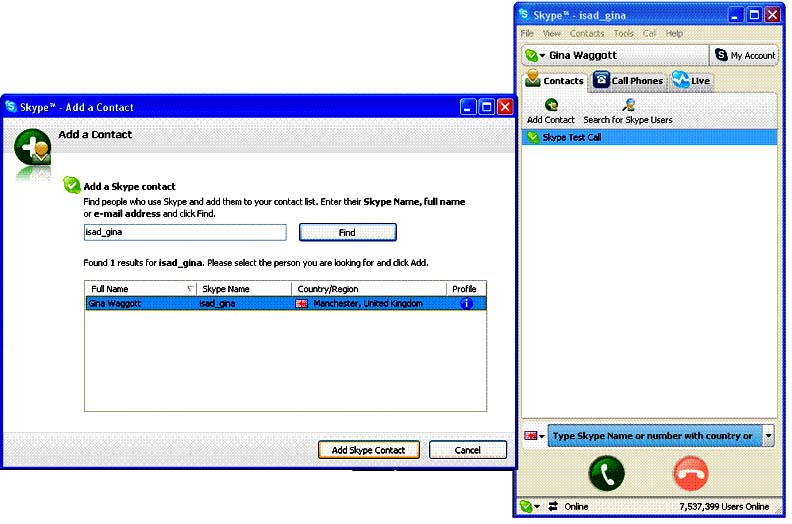Live Audio/Video Conferencing With Skype - Talk Online With People Who Stutter
 |
About the presenter: Jan Gaudissabois was born in Belgium in 1971. He writes, "Most of my life I've stuttered mildly, but can recall some rather difficult periods. I have been through a couple of speech programs, with various results, and I try to keep up practice, using voice chat and conferences over the internet, so feel free to get in touch ;-) . I studied arts and animation, and am working in animation-film field. I am passionate about traveling, music, arts, movies and... well... talking. |
 |
About the presenter Gina Waggott is a 26 year-old lifelong stutterer from Yorkshire, UK. Gina has been an Executive Board Member of the European League of Stuttering Associations (ELSA) for seven years, where she deals with Youth issues. She also sits on the Youth Committee of the European Disability Forum, representing those who stutter. She works for the BBC's corporate charity and is the English Regional rep for the BBC Disability Forum. She has written numerous articles, speeches and workshops relating to stuttering that have been read and heard throughout the world. Gina is the owner of StutteringChat, the world's largest online group for people who stutter. In her elusive spare time she enjoys listening to & creating music, art, writing, film, and approaching life and cooking with reckless abandon. |
 |
About the presenter Judy Kuster, M.S. in speech-language pathology and M.S. in counseling, is a professor of Communication Disorders at Minnesota State University, Mankato. She is well-published in Internet resources and has presented at state, national and international conferences. She is the webmaster for Net Connections for Communication Disorders and Sciences and the Stuttering Home Page as well as the coordinator of this online conference. She holds Specialty Recognition in Stuttering and is a member of the Division #4 Fluency and Fluency Disorders. She is a member of the National Stuttering Association, the International Fluency Association and the International Stuttering Association. |
Live audio/video conferencing with Skype - talk online with people who stutter
by Jan Gaudissabois from Belgium
Gina Waggott from England, UK
and Judy Kuster from Minnesota, USA
Live ISAD chats are scheduled on October 7 and 14 (as practice) and a big, official chat is scheduled on International Stuttering Awareness Day - October 22. All chats will take place at 8 pm GMT (UK time) and everyone is invited.
Jan: Some time ago I told all of my online contacts that "I don't text-chat anymore !" And of course, I had to explain myself. It is just amazing how much time one spends sometimes, trying to communicate in a proper way on one of the many online text-chat applications. Let's face it... it's a waste of time for people who stutter.
As there are many applications available nowadays, which feature voice-chat in a pretty good quality, and totally free, the choice is easily made. This possibility gives people who stutter an opportunity to do exactly that, what they always have been trying to run away from, and that's using one's voice as means of communication. It is a well known fact that people who stutter only talk a fraction of the amount of time non stutterers talk every day. And whether or not you have ever had any speech problem, there is no way you will ever be able to improve your speech without dramatically increasing your amount of time talking.... Now , I just noticed a little shiver going down your spine, ... well, that's understandable. I know how it feels.
Reasons can be found in the many negative experiences one has gathered over the years talking to other people, all the strange looks, the laughs, the wonders, the 'talk of the day' at your work, the embarrassment, the humiliation....
Talking has a kind of 'don't like it' feel to it, but it doesn't have to be, or stay this way.
There are several good reasons why talking to other people who stutter could help you cope with it all.
- You can dramatically increase the amount of time talking every day, and in a positive environment. Because after all, the person you are talking to stutters, too, knows exactly what it is, won't laugh, and hopefully won't complete your words, so there's nothing to fear or lose here.
- Sharing your thoughts, experience, worries and hopes with other people about stuttering can take a great deal of weight from your shoulders.
- Make new friends !
- Whichever technique you may have learned in whichever speech program can be practiced. There's several programs which have a large list of voice-chat users, and there are independent networks too.
- Desensitize yourself from stuttering itself. Let me explain myself. Anyone of you will probably remember some of the first times when you actually heard someone else stutter, be it in school, on the bus or whatever. You might remember how utterly confronting this might have been, and probably still is. Is this how I sound? Is it that bad??!! Oh dear!! Talking to other people who stutter, whether in a self help group or through voice-chat, decreases you sensitivity to stuttering. I myself am not bothered very much anymore by hearing other people stutter nowadays, so I guess I'm less embarrassed finding myself in that same spot.
- Overcome social fear. This is something everyone needs I think, even non-stutterers. After all, it's not such an easy thing, talking to a complete stranger or several of those... just like that... so why not try !?
Let me add that there's no good reason why you should voice-chat only with other people who stutter. There's plenty of opportunities for public voice-chat, if you're up to the challenge. Skype, as well as paltalk run massive public voice-chat sessions, and I believe that Yahoo messenger and MSN features full voice-chat including conference rooms. There are also closed circuit chat-applications like Ventrilo.
Gina and I plan to host some chats on Skype during the period of the online conference. To be able to join in, you'll have to add my skype ID, which is jan_sobie, to your list, and write a note in the invitation window, just so I know who's who.
Judy: Although audio/video conferencing should not take the place of in-person contacts that are typically an integral part of speech therapy, support group meetings, and every-day social contacts for people who stutter, checking through the archives of stutteringchat@groups.yahoo.com, it quickly becomes apparent that the consumer community of people who stutter have been exploring the potential of audio and video conferencing for face-to-face chats for some time. Skype has been used in the past two years for developing friendships, practicing skills learned in various programs, and for sharing ideas of strategies that have worked for some personally. One interesting idea that emerged was using Skype to gain confidence and desensitize the fear of speaking on a telephone.
In January 2007, an "exchange community" for persons who stutter was created on Mixxer, (http://www.languae-exchanges.org), a free educational community originally designed for language learners and teachers to find a language partner for language exchange. Although there are only a few who stutter who have signed up, Mixxer provides the potential for stutterers to connect through Skype with others who stutter in their own language.
The face-to-face communication opportunity provided through video conferencing is also being explored, and in some cases used by the professional community to augment services and to extend services to person for whom distance or disability makes frequent in-person opportunities difficult. Recent personal correspondence with three different professionals as well as searching through mailing list archives suggest several ways that video conferencing can be helpful:
- collecting data
- communicating with past, current and future clients
- setting up Skype to invite people from a distance to be able to participate in on-site monthly adult support group meetings
- inviting persons who stutter to address fluency disorders classes through video conferencing when distance precludes an on-campus visit
- working on research grants rather than using the telephone
- the potential for augmenting on-site therapy sessions
Gina: Now that Jan and Judy have explained some of the positive benefits of using online voice and video chat for professionals and for consumers to expand your comfort zones and practice speaking; you're probably wondering how YOU can use it.
Using an online chat programme is relatively easy, even for people who aren't very computer literate. For the purposes of this online conference, we're going to encourage you to use Skype. This is because it's one of the most widely-used programs (therefore most people you know are likely to have it already), it's free for basic chatting, it has a worldwide community, and it's easy to set up and operate. Best of all, we're organising the first ever ISAD international chat during the conference, that you can participate in with other people who stutter around the world.
As of July 2007, Skype had 220 million users, with 9 million online at any given time. If people who stutter make up the oft-quoted 1% of the population, that's a LOT of opportunity for practice! Of course, people who stutter may avoid using such tools that have an emphasis on voice, but that's exactly what we're trying to change.
What You'll Need
Skype will run on many platforms, from Macs and PCs to mobile phones or palmtops. There is a version for most of these, and you should refer to the Skype Help page if you have a particularly unusual way you want to connect. You'll need a microphone to plug into the mic jack on your soundcard (usually coloured pink). These are cheap and readily available from most computer shops (at about 6 GBP / 12 Euro / 10 USD) for a standard microphone that is more than adequate. You can listen to incoming sound through your standard speakers, or through earphones. It is recommended that you use a headset (not that much more than a mic) because using your machine's sound output generates an awful lot of feedback, and it tends to be impossible to have a decent conversation when even just a couple of chatters generate feedback, cause it bounces from one to another, and then doubles !! Very noisy. Also be aware that the latest skype version can only host up to 10 people at once.
Skype recommends a connection of 33.kps or above... a fast dialup modem or any broadband connection will suffice. Needless to say, the better your connection, the better the sound quality and response times.
How to get started
Firstly, you should visit www.skype.com and download the latest free version (at the time of writing, it is displayed on their homepage as version 3.5.0.239). The download is available directly from their page, or by clicking on the "Download" subtitle at the top. You should then unzip the .exe file that is saved to your drive. Step by step instructions can be found at:
http://www.skype.com/intl/en-gb/download/skype/windows/downloading.html
You now have Skype installed and ready to use! The Skype assistant will launch a test call to make sure that your sound and audio settings are working, and will record your speaking to the robot-answerphone, and will play it back to you. If you stutter, who cares? It's not even a human!
Joining the ISAD Chat / finding other users
Now that you've got Skype, you should seek other people (who stutter, or otherwise) to practice your speech with. Why not start with the authors of this paper? After all... we're going to host the ISAD chats, and we both stutter!
Skype will run you through how to "Add a Contact" when you first start the program. In case you skip this step, you should go to "contacts" on the menu, then "add a contact". When asked to type in your friend's Skype name, you should add isad_gina for Gina, and jan_sobie for Jan, as below:

You can do the same for any other people who you want to add. All you need is their Skype name, or you can search for them based on their real name, city, etc.
Jan and Gina (either one or both) will be hosting special ISAD chats for people who stutter on the 7th October and 14th October (as practice for everyone) and a big, official one on International Stuttering Awareness Day itself, 22nd October. All chats will take place at 8 pm GMT (UK time), so make sure that you have already added Jan or Gina as a Skype Contact, and that you are online at that time. You can check the time difference in your country at:
The World Clock - Time Zones (http://www.timeanddate.com/worldclock/) or on The World Clock - Time Zone Converter (http://www.timanddate.com/worldclosk/converter.html)
You'll get an invitation to join us (which will appear onscreen), then -- talk away! Of course, feel free to connect to others at any time -- that's what it's there for! Other people who stutter are the safest and most enjoyable audience when chatting online for the first time. They know how it feels, and you won't be judged on your speech. If you just feel like listening, then please do. You can also use a text chat button if you feel you just want to type rather than talk.
We look forward to seeing you there!
September 24, 2007

